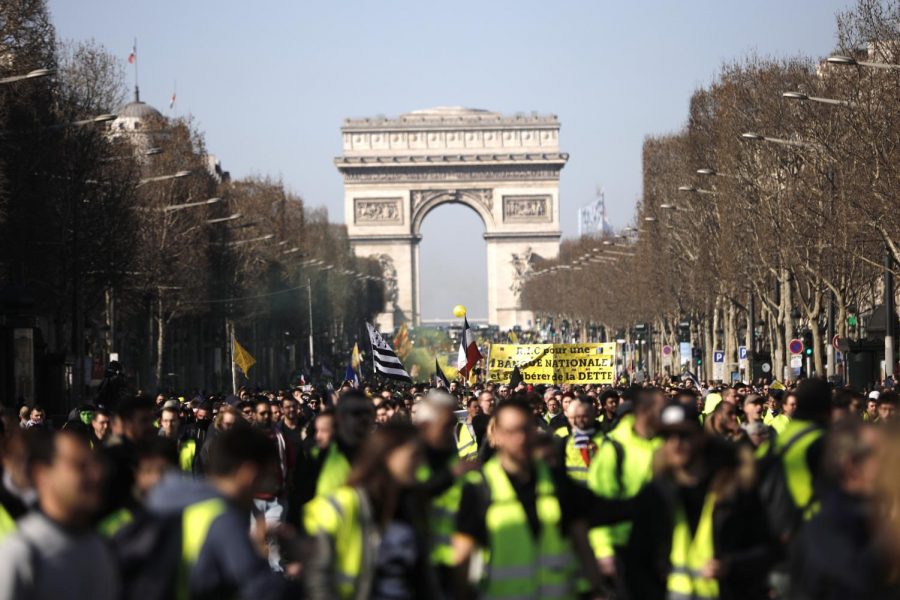Yellow Vest protestors stir conversations, controversy
February 25, 2019
When French President Emmanuel Macron announced a green tax on fuel as part of his environmental policy strategy in November, it caused people to start protesting around France. What started in French provinces far from the capital quickly spread to Paris, and the protestors — who wear the fluorescent safety vests that all French motorists have been required to keep in their vehicles since 2008 — the “gilets jaunes,” or “yellow vests” movement, was born.
While the protestors’ original focus was on fuel price rises, it soon became a broader movement against Macron, whose critics had long called him a “president of the rich,” and his government policies. While the movement is mostly mobilized through social media and has no official leaders, a January post on a Facebook page co-founded by protestors Priscillia Ludosky and Eric Drouet, detailed a list of demands including direct talks with the government, lower taxes and the introduction of a citizens’ initiative referendum. Others have also called for raising the minimum wage and reforming the country’s pension system.
“The protests began against a proposed gas tax but have now become a movement against the current French government,” said Clara Orban, a professor in the French language department at DePaul University. “The protesters have brought attention to not only the tax but also to dissatisfaction with the Macron government.”
The movement saw as many as 282,000 people protesting during its early weeks, and it drew international headlines in December when thousands marched down the Champs Élysées and vandalized the Arc de Triomphe. It soon became a magnet for violence, with some protesters throwing objects at security forces, setting vehicles on fire and smashing shop windows. On Saturday, though, protests in Paris were mostly peaceful, with France’s interior ministry reporting 5,800 people at five different demonstrations in the capital. Nationwide there were roughly 46,000 protestors, with dozens of arrests, including near the Eiffel Tower where 28 were arrested as the protestors began to dissipate.
“The violence, anti-semitism, and the extremisms in general are not really the core of the movement, but as the movement shrank, these elements are more and more apparent,” said Allan Potofsky, professor of history at Université Paris-Diderot in Paris. “So, you’re getting anti-semites, getting some nationalists, and the ones who attack the police, they’re anarchists.”
On Saturday Feb. 16, Jewish philosopher and writer Alain Finkielkraut was targeted with threats and anti-semitic remarks by a group of protestors in central Paris. It reflected badly on the movement as a whole, and signaled something of a turn in public support for the protestors. According to a recent poll conducted by IFOP, 52 percent of French people now want the weekly protests to end.
“The gilets jaunes movement and its short and long-term ramifications for France are far more complex than many non-French media sources are leading people to believe, and it remains an unfolding story,” said David Wellman, an associate professor at DePaul University, who is currently working on a book about religion in Paris. “While the press in the United States has often focused on violence associated with some of the demonstrations in larger French cities such as Paris, the demonstrations which have taken place in many of France’s smaller towns have been largely peaceful and have provided a great opportunity for many people to not only express their very legitimate grievances but also to reach out to their neighbors to discuss the future of their country.”
It is clear that the yellow vest movement has had a huge impact on France’s political structures and its people, as president Macron pulled back on his gas tax and launched a series of debates around the country. The months-long effort is an attempt by the president to speak with ordinary citizens and local officials about what should be changed and what the French people want.
“It accomplished moral victory, where the victims of neoliberalism — meaning economic deregulation and economic reforms that are generally favorable to the rich — and austerity measures of closing down public services,” said Potofsky. “I think the gilets jaunes movement has shed light on [the fact] that we can’t continue this way.”
